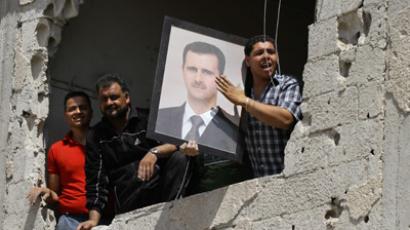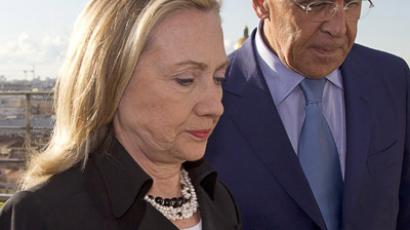Washington’s new tricks on the road to global dominance (Op-Ed)

The latest round of the war against an independent Syria unfolded in Paris last week at the gathering of the “Friends of Syria”.
Russia and China very rightly did not attend this “amoral” – in the diplomatic language of the Russian Ministry of Foreign Affairs – meeting. At the meeting western champions of the war insisted on their interpretation of the one-week old Geneva agreements: “transition government based on mutual consent” means “Bashar al-Assad must go”, affirmed French President Hollande.This recent round of pressure highlights two new tactics employed by Washington: word games and an end-run around the United Nations itself.First, the new formula “transition government”. The authoritative Merriam-Webster dictionary defines “regime” as “government” and “change” as “transition.” Thus, for those who reject “regime change,” a euphemism was created that has much better chances to go through.Interestingly enough, this term was promoted by an expert of Russian origin, Dmitri Trenin, Director of the Carnegie Moscow Center. On June 28, 2012 Trenin published a suggestion in his piece “Syria: A Russian Perspective”: “Russia might be willing to cooperate with the U.S. and other countries if the goal moves towards “transition” rather than “regime change” – what has been dubbed the “Yemen model.”So who is Mr. Trenin? This retired Soviet colonel was a Senior Research Fellow at the NATO Defense College in Rome just before he was recruited in 1993 to join the Carnegie Moscow Center, created the same year by none other than Michael McFaul, the current US Ambassador in Moscow. After nearly 20 years in the pay of the Americans Trenin was rewarded with his current post as director by his former boss, Rose Gottemoeller, who left Moscow in 2008 to join the State Department where she is now Under Secretary for Arms Control and International Security. Big shoes to fill for Mr.Trenin, but in Washington they know how to pick their cadre.The board of the Carnegie Endowment in Washington features – this world is truly small – Kofi Annan himself. Among the Endowments “Funders and Supporters” are George Soros’s Open Society Institute, the US National Intelligence Council, the US Defense Intelligence Agency, the US Defense Department, and a collection of other private and public enthusiasts.Of course the “transition government” and “Yemen model” are nothing other than “regime change.” Honestly: we, Russians, brought up on Tolstoy and Chekhov, should be able to miss Washington’s elementary-school semantic traps.Secondly, unable to push anti-Syrian resolutions through the UN Security Council due to Russia and China’s staunch resistance, Washington is building up a group of more than hundred nations more pliable to US pressure. Such “coalitions of the willing” have been put together before, but this time the number of countries makes it look like a parallel anti-UN construct acting as if it is replacing the UN General Assembly itself.Such a gathering, despite total absence of legitimacy, is not just a talking platform. French Foreign Minister Laurent Fabius told “Le Parisien” that the Paris meeting would push for a Chapter VII United Nations resolution to enforce the transition plan. A Chapter VII resolution can authorize the use of military force "to maintain or restore international peace and security."In the short term, the United States may attempt to institutionalize this ad hoc grouping into a mechanism to implement a “final solution” to President Al-Assad. In the long term, Washington may try to solidify such structure into an anti-U.N. body of sycophants, ready and willing to approve any U.S. initiative.Now, from tactics to strategy. Looking at the type of leaders that are seizing power in the Arab world with American assistance, a normal person is perplexed: why does the United States, with assistance of their local satellites, keep on removing moderate secular governments and bringing to power, in one country after another, increasingly radical extremists – that same type of people who committed 9/11, the greatest tragedy in U.S. post-WWII history?Indeed, this question is not solvable by listening to Washington’s official line of arguments. But take a look at the policies of the US and its European partners during the in the 1930s. Then, America and its ever so reasonable and civilized European allies provided the financial, industrial and political support encouraging the highly energized, violent extremist Nazi and fascist movements in Europe. With a purpose: to direct its violence against Russia. According to the plan, Germany and Russia were to exhaust themselves so that the US would emerge dominant.Similarly, the earlier use of al-Qaeda in Afghanistan and again today the encouragement of various Muslim extremists including elements of the Muslim Brotherhood are part of the plan to create a regional movement which could be thrown against Iran, Russia and China. Such a furnace of war and chaos in the Middle East, the Caucasus and Central Asia will permanently disable all three of America’s strategic rivals and allow Washington to rise to uncontested world domination. We should be able to decipher not only US language, but also US strategy. In the 1930s, the Soviet Union was at the front line of the fight against Fascism in Europe. Today, Russia owes it to its history and to the fallen in the anti-fascist struggle to recognize and before it is too late avert American designs. We must prevent Russian and other people from being drawn into a bloodbath of mutual extermination in the voracious interest of Washington’s drive for global hegemony.
Veronika Krasheninnikova, Director General of the Institute for Foreign Policy Research and Initiatives in Moscow, for RT
The statements, views and opinions expressed in this article are those of the author and do not necessarily represent those of RT.














